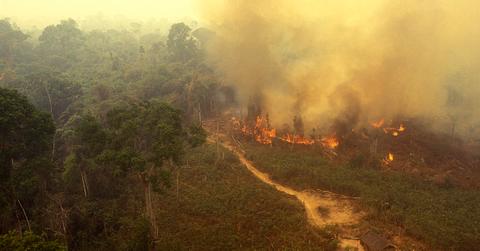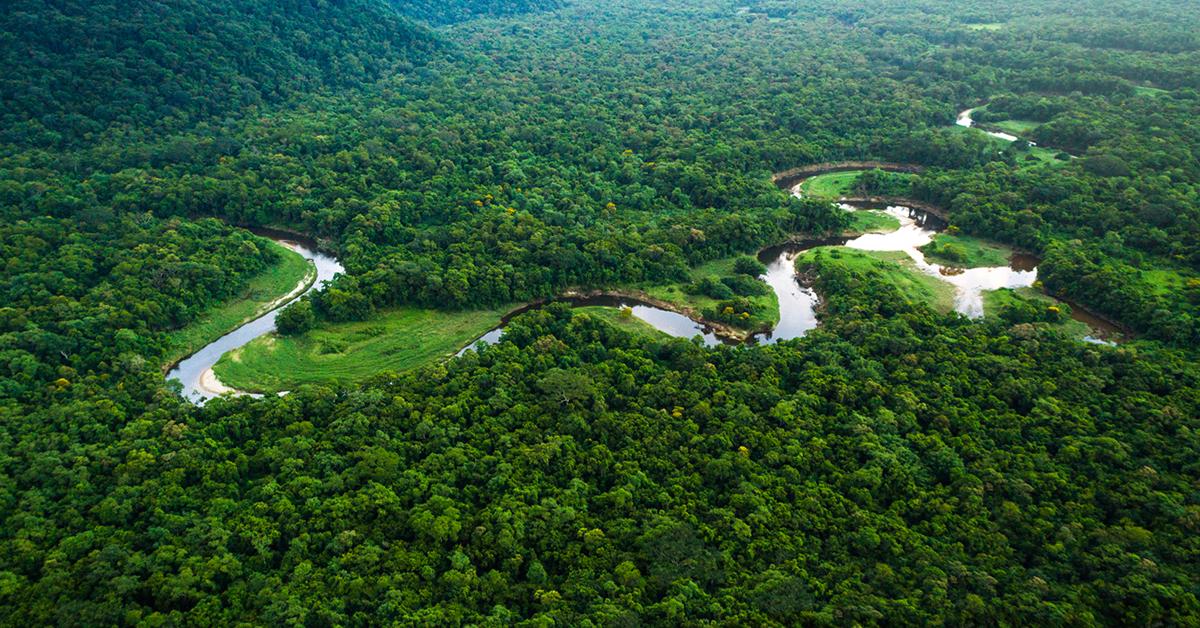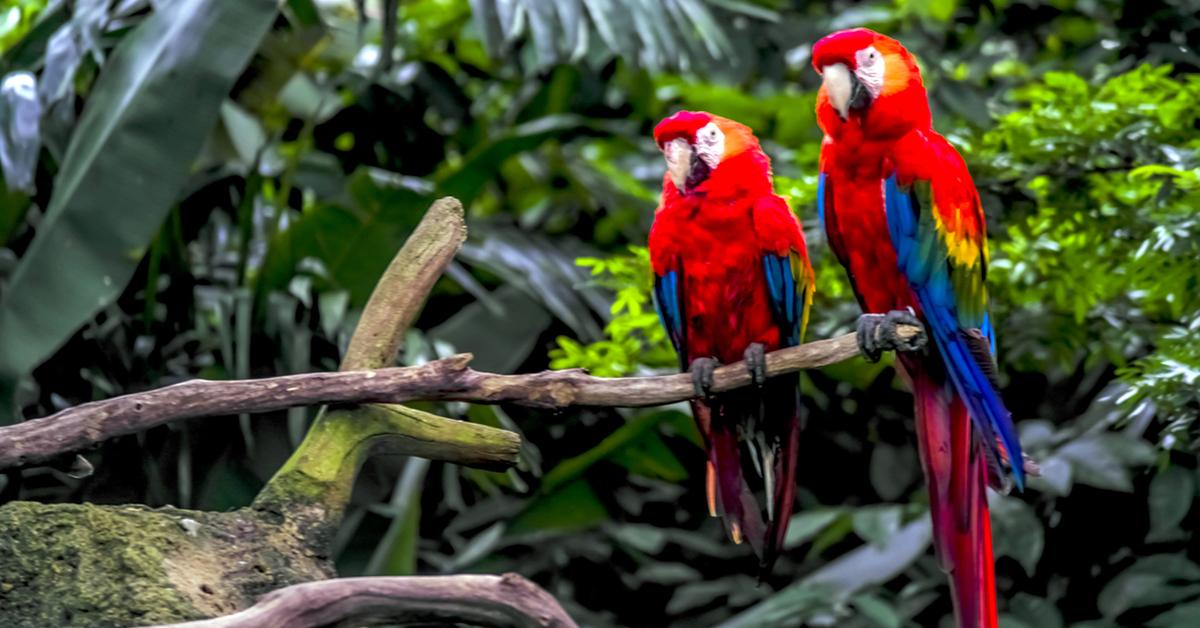The World Can’t Survive Without the Amazon: Here’s Why
The fires in the Amazon aren’t just affecting those who live there — it’s also affecting you.
Updated Aug. 22 2019, 2:13 p.m. ET

As you’ve likely heard by now, there are fires ravaging the Amazon rainforest; the current fires are so extreme, they can be seen from space. The record-breaking blaze is believed to be started by cattle farmers, as a way to illegally deforest land, and is unlike anything the region has seen before: This year alone, there have been more than 72,000 fires — an increase of more than 83 percent from January to August of the year prior. And these fires aren’t just a catastrophe for those living in and around the rainforest, the destruction of the Amazon would be a disaster for everyone who lives on Earth.
The Amazon is called the “lungs of the Earth” and for good reason — around 20 percent of the planet’s oxygen originates in the Amazon. The vast rainforest also absorbs carbon dioxide and lowers the amount of greenhouse gases, therefore regulating global temperatures and, in effect, slowing the rate of climate change.
As Fernando Espírito-Santo, a researcher at NASA’s Jet Propulsion Lab, found, dead Amazonian trees emit around 1.9 billion tons of carbon a year, but the rainforest absorbs more than 2.2 billion tons of CO2, making it a sink for carbon dioxide (in other words, it absorbs more CO2 than it produces). If the rainforest were to dry out — from deforestation, drought, or the fires — it could instead become a source of more carbon dioxide in our atmosphere, contributing to climate change, rather than fighting it.
Additionally, deforestation could have extreme effects on the weather all over the world. As Deborah Lawrence, an environmental scientist at the University of Virginia, found, the loss of the rainforest could change rainfall patterns around the globe, which — in turn — could have a devastating impact on agriculture.
“Most people know that climate change is a dangerous global problem, and that it’s caused by pumping carbon into the atmosphere. But it turns out that removing forests alters moisture and airflow, leading to changes — from fluctuating rainfall patterns to rises in temperatures — that are just as hazardous, and happen right away,” she said per Climate News Network. “The impacts go beyond the tropics — the U.K. and Hawaii could see an increase in rainfall, while the U.S. Midwest and Southern France could see a decline.”
She continued, explaining the effects on agriculture, “Farmers, so reliant on consistent and reliable growing conditions, could lose their bearings, and even their incomes, when facing these ups and downs in temperature and rainfall. While farmers may ultimately adapt to shifts in the season, it’s difficult, if not impossible, for farmers to adapt to increased floods or parched soils.”
Like the forest itself, the water of the Amazon also impacts life all over the world; according to Conservation International, 20 percent of the world’s freshwater comes from the Amazon River basin. Not only do the local communities (of more than 30 million people) rely on the water for everyday life, but it also provides hydropower for millions of people. The World Wildlife Federation reports the Amazon River also makes up around 15 percent of the world’s total river discharge into the oceans, and the river’s streams and tributaries “contains the largest number of freshwater fish species in the world.”

Which isn’t surprising, as the Amazon is home to at least 10 percent of the world’s known biodiversity, per WWF (though many researchers believe that number is closer to 30 percent), and, according to National Geographic, an estimated half of the millions of species living in tropical rainforests have yet to be cataloged. Losing the Amazon would mean losing many of the animals that make up the tropical rainforest ecosystem — as well as the millions of people, made up by 400-500 different Amerindian tribes, who call the Amazon home.
Though the loss of the trees that absorb the carbon dioxide would be disastrous, there are an estimated 40,000 plant species in the Amazon — all of which impact people all over the world in different ways. Tropical rainforests are responsible for many foods we eat, such as bananas, citrus, avocados, cashews, Brazil nuts, vanilla, sugar, and coffee, to name a few.

Countless modern medicines also originate in the rainforest. One cancer drug that is being researched, and has proven to be effective, was found in the Amazon, The Daily Beast reports. Another medication being studied to treat HIV also has roots in a rainforest.
While it may be hard to believe that what’s happening in the Amazon can impact your everyday life, it's probably just as hard to imagine that there are actions you can take — no matter how far away you are, or how helpless you may feel — to minimize the impact of the fires.
One of the main things you can do is donate to organizations — such as the Rainforest Alliance or Amazon Watch — who are actively fighting for the not only the people of the Amazon, but also for the planet. These groups use the funds to defend the forest and bring action and awareness to the Amazon’s needs; even if you can’t make a monetary donation, you can pledge to stand in solidarity with the indigenous groups, the animals, and the rainforest itself.
You can also eliminate (or, at least, cut back) on your consumption of meat, dairy, wood, paper, and palm oil products. The demand for these products is leading to more and more deforestation. You can also consult lists made by groups such as the Rainforest Alliance to make sure you are buying rainforest-safe products for your home. Being a conscious consumer, and acting with your wallet, is one of the loudest and most significant ways you can voice your opinion and show your values.
Another important step to take is voting for officials that understand the importance and urgency of the climate crisis — no matter how far away from the rainforest you may be. Electing officials that will institute progressive policies and prioritize the environment is essential to ensuring a better future for the planet and generations to come.